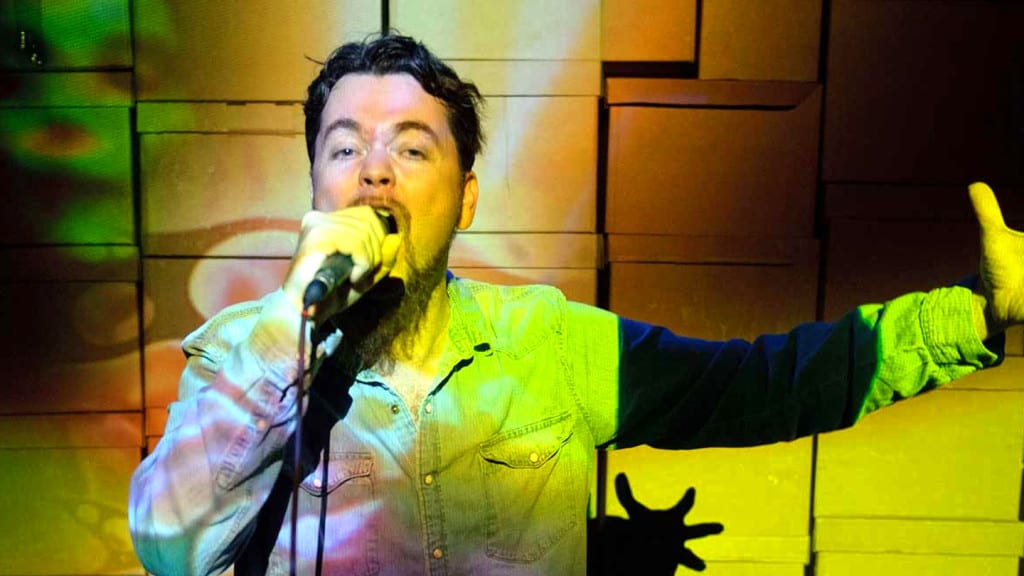A living testimony to the Living Theater Movement, in hip-hop. What could go wrong?
I am far from an expert on the work of Steven Ben Israel, so I roamed the interactive gallery space just before the show began to try to get a feel for the ideas and visions of this storied leader of the Living Theater Movement. Immediately, big blocked letters on the wall caught my attention: “to be, a mensch! that is the answer.” Apparently, The Spinning Wheel would fuse not only hip-hop, art, and the political protest movement of the 1960’s—Woodstock icon Wavy Gravy himself was slumped on a front row seat right below me—but also the Yiddish sensibilities of Ben Israel.
The Spinning Wheel is the brainchild of Steven’s son, Baba Israel, who created the play to commemorate the life of his recently deceased father. At times the performance captured the peaceful and profoundly creative, yet determined and relentless, vibe of the father’s political tactics and artistic sensibilities. During these sequences, the multimedia performance was indeed an engaging, inspiring celebration of the elder Israel’s life and works. Baba Israel’s words seemed to dissolve the linear progression of time while weaving anecdotes of youth, parenthood, and humanity into a passionate and often beautiful personal narrative. Walls of stacked boxes lining the stage came to life as images were projected onto their surface. Baba Israel threw down rhymes over guttural noises and instruments looped by YAKO.
More often, however, the antagonistic and resentful spoken word act stood in stark (and dark) contrast to the father’s composed coolness and originality. Periodically, it seemed I had walked into a live rendition of the scene from Willy Wonka & the Chocolate Factory (1971) where Gene Wilder screams from the helm of a boat that moves faster and faster while graphic images flash and loud noises blare around the walls of a shrinking tunnel, largely without rhyme or reason. Similarly, video clips of Steven Ben Israel flickered onto the boxes often in defiance of his son’s inexplicable rage and resentment.
At one point, Baba went on a rhythmical rant, listing many of the people he’d like to see “shut the fuck up.” In opposition to his father’s legacy and desire to improve the human condition by expanding people’s consciousness, it seemed Baba would find the world a better place if everyone he didn’t care for would just shut the fuck up and get out of his way, particularly when he was negotiating his baby stroller through the streets of his New York.
The show concluded in the “Unfuck it ritual.” Here, the audience was invited to shout out evils in the world they wish to be “unfucked.” The hip-hop duo then used these societal ills, ranging from high rise buildings, to the police, to arthritis (thanks to Wavy Gravy for widening the spectrum of issues) in a freestyle rap to symbolically rid the audience of all their tsuris. Shouts of “Fuck the police!” from the overwhelmingly white, well-heeled audience was disconcerting, particularly after hearing the stories of Steve Ben Israel’s reluctance to scapegoat individuals for what he considered the deep-seated structural issues afflicting American society
Nevertheless, any misgivings about The Spinning Wheel are forgiven by the show’s effective and moving combination of visual and performance art with music, raw emotion, and story. If you’re looking for a journey through a tangle of time, hip-hop, and hippies that inspires political activism, look no further.
A trailer from The Spinning Wheel’s U.K. tour can be seen here.
* If you can’t make these showings, you can check out the free interactive gallery show which is open to the public until the 29th of January.

